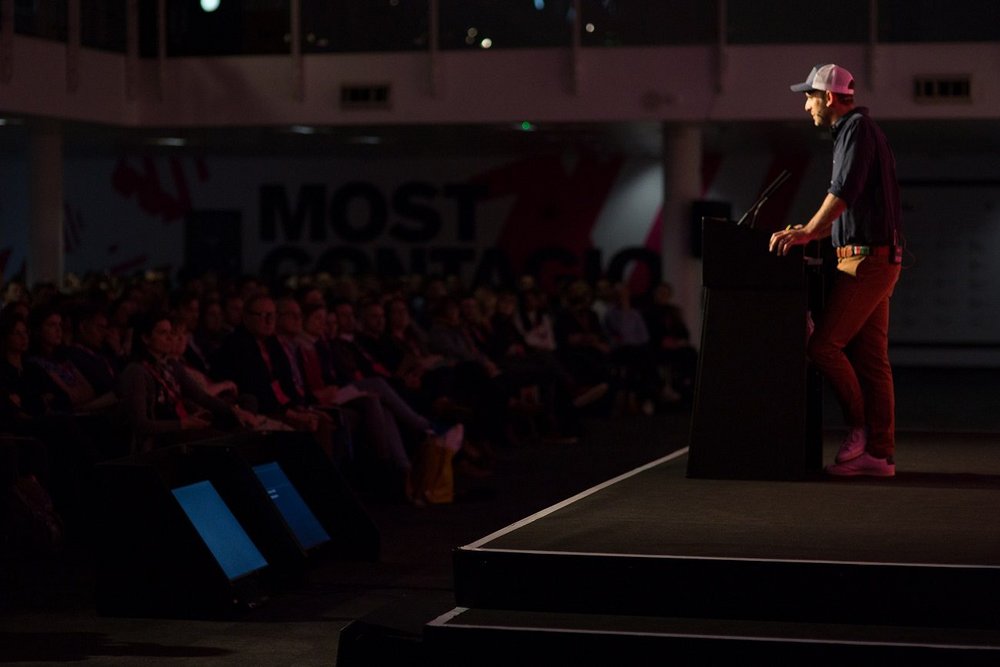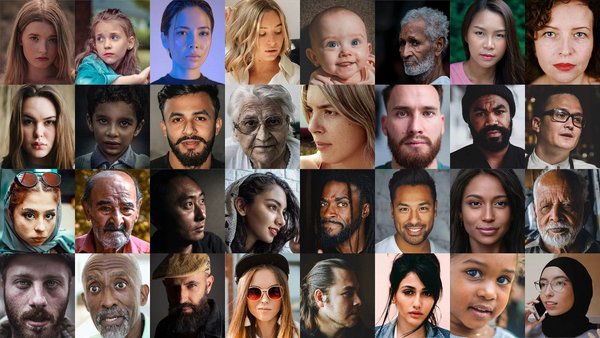Sleeping Giants’ Matt Rivitz: Covid-19 has unleashed an ‘information apocalypse’ /
Sleeping Giants founder Matt Rivitz on why he fears we risk losing a 'shared truth' amid the coronavirus pandemic
Contagious Contributor
/
Image: Matt Rivitz speaking at Most Contagious 2019
This period we’re living through is tough for anyone, but try living it as a neurotic Jewish ad man. I’ve had the Coronavirus at least seven times now for periods not exceeding three hours. I’ve washed my hands four times since I started writing this piece, and I haven’t worked a day out of the last month.
But nothing, not the prospect of living in these four walls for the next year with my entire family or my kids playing Fortnite until their eyeballs bleed during the school day, has worried me more than the state of the current media landscape and the very idea of losing a shared truth.
This is a health crisis for people around the world, sure, but it’s an apocalypse for information. In 2016, I made a horrifying discovery just after the US presidential election: Advertising, the business that I had poured my heart and soul into for the last 24 years, was very literally supporting hate, bigotry and white nationalism.
Breitbart News, which was being run by Stephen K Bannon, Donald Trump’s campaign manager, had never been on my radar. Safely ensconced in my filter bubble, I was blithely unaware of their content, which included articles like, ‘Hoist it High and Proud: The Confederate Flag Proclaims a Glorious Heritage’, ‘There’s No Hiring Bias Against Women in Tech, They Just Suck in Interviews’ and even a ‘Black Crime’ tag for articles solely about crimes perpetrated by African Americans. To see these articles published was a punch in the gut. But what was far worse was that they were all supported by ads, some from brands which I had worked on previously in my career.

In late October of 2016 I opened an anonymous Twitter account, called it Sleeping Giants, took screenshots of the ads next to these horrendous articles and tweeted them directly to the advertisers’ Twitter accounts. Within hours, the first advertisers got back to me and said that, in fact, they didn’t even know how the ads ended up there. As it turns out, it was because ad networks like Google and Facebook put them there without their knowledge. It was a part of advertising that, as a writer predominantly for TV ads, I had never heard of before: programmatic advertising. And what I’ve learned since is that it is responsible for unimaginable damage, not just to advertisers’ reputations, but to the internet and society itself.
Sleeping Giants is now in 12 countries and has seen over 4,300 advertisers leave Breitbart, over 40 advertisers leave Fox News’ Bill O’Reilly’s show over his sexual harassment suits (which resulted in his dismissal), conspiracy theorist Alex Jones being de-platformed from social media and a bunch of neo-Nazi groups lose their ability to use online fundraising platforms. It has also resulted in death threats against my kids, a threat of a lawsuit by Breitbart and relentless harassment by Nazis. It has been an interesting way to spend my midlife crisis, to say the least.
Matt Rivitz, Sleeping Giants
What it hasn’t done is change programmatic advertising and that concerns me greatly. By failing to enforce their own rules, ad networks like Google and Facebook’s Audience Network, have allowed not only hate and harassment to thrive, but disinformation and conspiracies, both of which are running rampant in our current health crisis.
Ad safety companies, which saw an opportunity in the work Sleeping Giants had done, promised to keep ads off sites that might result in negative associations. But instead of using common sense measures, like simply reading the content put on certain sites or only placing ads on sites with a pedigree in reporting facts, they’ve used a sledgehammer, eliminating placement on articles based on keywords like, ‘coronavirus’ or ‘Trump’. This chemotherapy-like approach has shut off advertising dollars not only to clickbait-y, conspiracy sites, but to quality news sites, nearly putting the final nail in the coffin for local and regional journalism right when we need it the most.
And social networks are far worse. After promises to take a hard line on misinformation dealing with Covid-19, Facebook, Twitter and YouTube have allowed metric tons of it, from ads selling non-compliant masks to videos from conspiracy groups that have racked up millions of views to state-sponsored bot networks pushing propaganda. And all of it, all of it, is supported by our industry. We keep the lights on at these social networks, after all.
If this health crisis has a bright side, it’s that misinformation is easier than ever to spot. It’s all pretty black and white. And because of it, it has exposed everything that’s wrong with our media and social media environments. It is, if I may say so, a fucking mess.
So the real question now is what we will do with it. As a business that pays for the free internet, we, perhaps, have the biggest say in how it changes. Will we continue to allow our reputations to be sullied on sites that run counter to our corporate beliefs? Will we still pour good money after bad into social platforms that don’t seem to much care about the hate, harassment and disinformation that poison our discourse? Will we build tools that can allow us to advertise safely without killing journalism, which protects our democracy and keeps us informed in times like these?
We have a chance right now to remake the systems by which we receive our information in times of crisis. I’m just one person, but I hope that we decide collectively to use our tremendous buying power to make real and true change before it’s too late.
While you’re deciding, I’ll be over here. Washing my hands again.
To subscribe to our quarterly publication, which is filled with the most creative ideas and sharpest insights from the world of marketing and beyond, click here.
Want more of the same? /
We don’t just write about best-in-class campaigns, interviews and trends. Our Members also receive access to briefings, online training, webinars, live events and much more.







